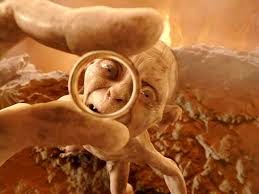 |
| leo infantem amat (and could probably eat a whole one) |
Phew! After such hard work, we were all ready to change tack. Last week, we heard Plato's tale of Gyges and the Ring of Invisibility, which explores the issue of virtue (or good behaviour) and why people are either good or bad. Dr. Kyle Harper of Oklahoma University explains the tale clearly:
We followed Plato's enquiry up with our own line of questioning about virtue by considering some modern-day moral dilemmas. Here are some of the ones that got you thinking:
 |
| Rings + Invisibility = Trouble |
Property developers have approached your parents – they want to buy your home and demolish it in order to build a research centre in which animal experiments will be conducted. They offer double the market value. What would you try to convince your parents to do?
You have a maths test in a week’s time. You think you’ll do OK in it as you’ve been working hard all term. Your mate is really worried as he’s been finding the work really difficult. Walking home on your own from school you find a brown envelope on the floor. You open it to discover it contains a copy of the test – your teacher must have dropped it. What do you do? Who do you tell? Anyone?
You’re at a party. A girl comes over to you and tells you how much they love the (fake!) designer watch you’re wearing. They offer you £200 for it. It cost you £20. Do you make the trade? By the way, you don’t know this girl, where she goes to school, where she lives, nothing.
After reading dilemmas like this, there ensued a lively class debate about how we'd act, thinking about the possible consequences of our actions. Could we turn a blind eye to animal testing, even if we opposed it, if it meant financial security? What's the best way to help a friend? Would it be fair to the rest of the class if they had an advantage in the test? What would happen if you sold that fake watch only to find out the girl had some big, angry brothers? No right or wrong answers, but plenty of food for thought about what drives us when we make moral decisions.
